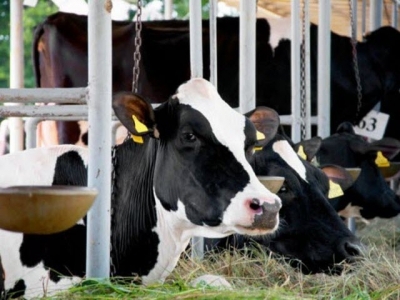Volatile fatty acids improve growth performance of dairy calves: study

Chinese research shows average daily gain linearly increased for dairy calves with branched-chain volatile fatty acids (BCVFA) supplementation.
“The results suggested that the supplementation of BCVFA improved the growth performance of calves by promoting nutrient digestibility, ruminal fermentation and hepatic lipid oxidation,” noted the researchers.
The researchers said that considering the effects of acetate on hepatic gene expression and the positive role of BCVFA supplementation on ruminal acetate production seen in other studies, they hypothesized the increased acetate production with BCVFA supplementation could improve growth performance and energy utilization of calves by regulating hepatic lipid metabolism.
Their study, thus, evaluated the effects of such fatty acids in feed on growth performance, ruminal fermentation, nutrient digestibility, hepatic lipid content and gene expression of dairy calves.
As part of the trial, the researchers said they also assessed blood parameters and relative mRNA expressions of PPARα, SREBP1, CPT1, ACACA, FAS and phosphoenolpyruvate carboxykinase (PEPCK) in the liver of calves.
The scientists said they randomly assigned 48 Chinese Holstein male calves (10 months of age; 345 ± 6.4 kg of body weight [BW]) to four treatments with 0, 60, 120 and 180 mg BCVFA per kg BW per day for each calf.
They explained that they hand-mixed supplemental BCVFA into the top third of the daily ration, fed to calves for 100 days of the experimental treatments.
Results
They found that supplementation of BCVFA in the calves ration increased average daily gain (ADG) and feed conversion linearly.
Dry matter (DM) intake was unaffected, but digestibility of DM, organic matter, crude protein, ether extract, neutral detergent fiber and acid detergent fiber increased linearly with increasing levels of BCFVA supplementation, they added.
Similarly, supplementation of BCVFA linearly decreased ruminal pH and ammonia-N but increased total VFAs, they said.
In addition, the researchers noted that molar proportion of acetate linearly increased, whereas propionate linearly decreased and the ratio of acetate to propionate increased linearly with increasing BCVFA in rations.
Relative mRNA expressions of peroxisome-proliferator-activated receptor α and carnitine palmitoyl transferase-1 also linearly increased with BCVFA levels, said the Chinese team.
“Due to the insignificant difference between 120 and 180 mg groups for all parameters, the optimum supplementary dose of BCVFA was 120 mg per kg BW per day,” they concluded.
Related news
 Elanco shifts focus on dairy research to address diseases, animal health
Elanco shifts focus on dairy research to address diseases, animal health Elanco Animal Health shifts dairy portfolio work to cover microbiome-based products, ways to protect or support animal health and a focus on addressing disease
 Dairy farmers offer advice for successful calf programs
Dairy farmers offer advice for successful calf programs Every dairy farm is different, but when it comes to calf programs, there may be more similarities than expected.
 Wet weather boosts mycotoxins risks for US dairy, beef producers
Wet weather boosts mycotoxins risks for US dairy, beef producers Analysis of US feed crops highlights concerns for ruminant producers from mycotoxin presence and levels, says nutritionist.